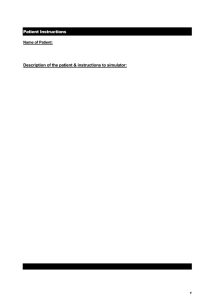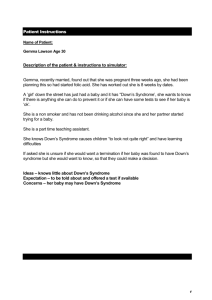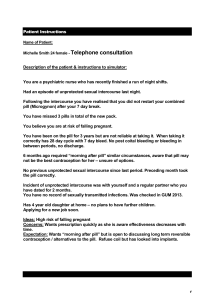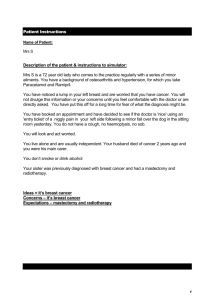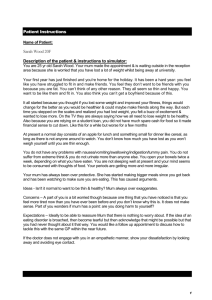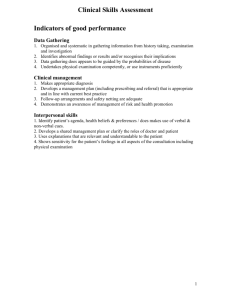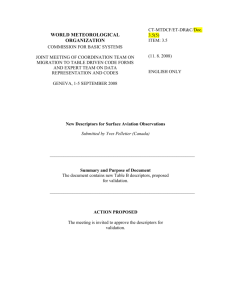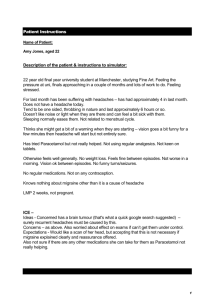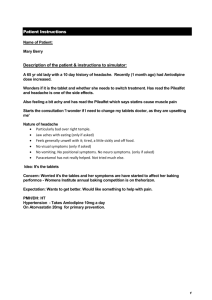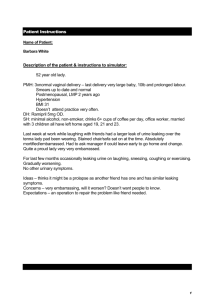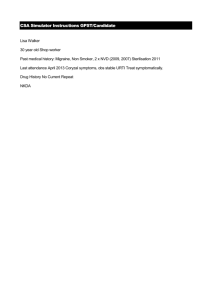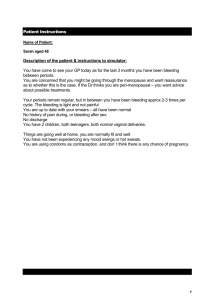Gestational diabetes - Pennine GP Training
advertisement
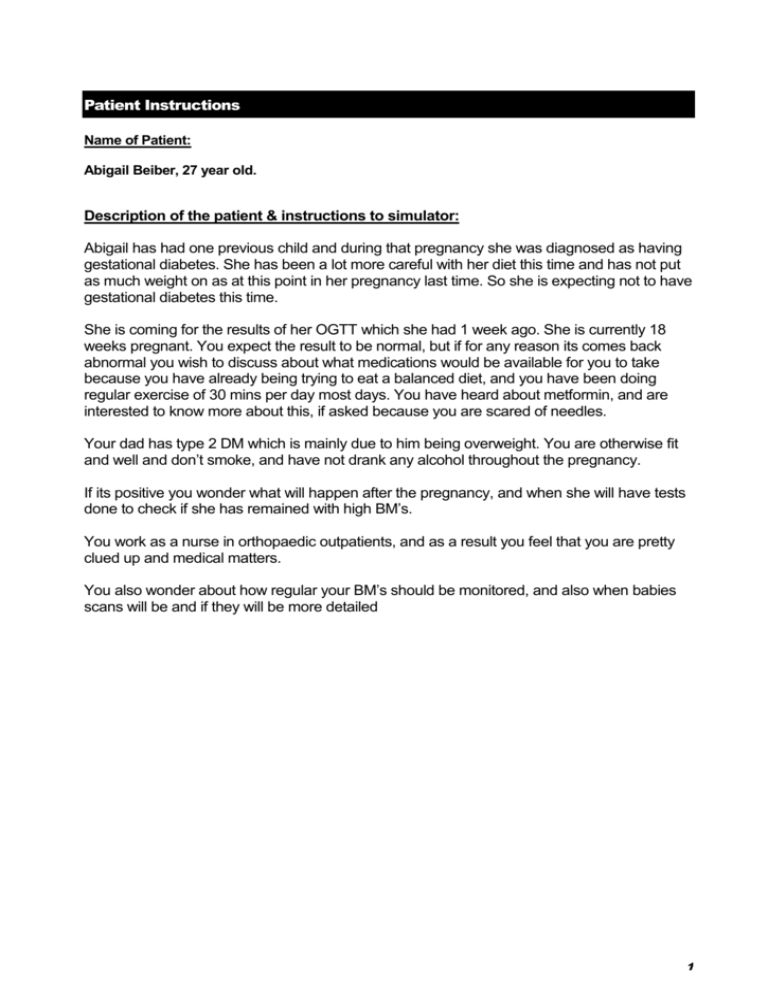
Patient Instructions Name of Patient: Abigail Beiber, 27 year old. Description of the patient & instructions to simulator: Abigail has had one previous child and during that pregnancy she was diagnosed as having gestational diabetes. She has been a lot more careful with her diet this time and has not put as much weight on as at this point in her pregnancy last time. So she is expecting not to have gestational diabetes this time. She is coming for the results of her OGTT which she had 1 week ago. She is currently 18 weeks pregnant. You expect the result to be normal, but if for any reason its comes back abnormal you wish to discuss about what medications would be available for you to take because you have already being trying to eat a balanced diet, and you have been doing regular exercise of 30 mins per day most days. You have heard about metformin, and are interested to know more about this, if asked because you are scared of needles. Your dad has type 2 DM which is mainly due to him being overweight. You are otherwise fit and well and don’t smoke, and have not drank any alcohol throughout the pregnancy. If its positive you wonder what will happen after the pregnancy, and when she will have tests done to check if she has remained with high BM’s. You work as a nurse in orthopaedic outpatients, and as a result you feel that you are pretty clued up and medical matters. You also wonder about how regular your BM’s should be monitored, and also when babies scans will be and if they will be more detailed 1 2 Doctor’s (GP ST) Instructions Name & age of patient Abigail Beiber 27 years old Summary Card PMH: gestational diabetes DH: nil Allergies:NKDA BP/BMI/ ?smoking and alcohol hx: Nil Case Notes - Last few entries in records: Latest OGTT shows a blood sugar of 8.1 3 CSA EXAMINATION CARD Patient Name: Abigail Beiber 27 years old Examination findings: Entirely normal Baby normal size 4 CSA Case Marking Sheet Case Name: Case Title: Context of case Gestational diabetes Assessment Domain: 1. Data-gathering, technical and assessment skills Positive descriptors: Finds out worries re needles Finds positive FH Finds out ICE Negative descriptors: Assessment Domain: 2. Clinical Management Skills Positive descriptors: Correctly identifies gest DM Explains gest diabetes and concerns to baby, and mum Discusses how to manage, with referral Explains close f/u of baby with scans etc Negative descriptors: Assessment Domain: 3. Interpersonal skills Positive descriptors: Negative descriptors: Address ICE empathetic Patient centred Other aspects e.g. time keeping, consultation structure, comment on consultation skills etc Positive descriptors: Negative descriptors: Grading: Clear pass = 3, Marginal Pass = 2, Marginal Fail = 1, Clear Fail = 0 Data Gathering Score = Clinical Management Score = Interpersonal Skills Score = Total for case = (max = 9) General Feedback/Comments 5 GENERIC INDICATORS FOR TARGETED ASSESSMENT DOMAINS – Crib Sheet 1. DATA-GATHERING, TECHNICAL & ASSESSMENT SKILLS: Gathering & using data for clinical judgement, choice of examination, investigations & their interpretation. Demonstrating proficiency in performing physical examinations & using diagnostic and therapeutic instruments (Blueprint: Problem-solving skills, Technical Skills) Positive Indicators Negative Indicators Clarifies the problem & nature of decision required Uses an incremental approach, using time and accepting uncertainty Gathers information from history taking, examination and investigation in a systematic and efficient manner. Is appropriately selective in the choice of enquiries, examinations & investigations Makes immediate assumptions about the problem Intervenes rather than using appropriate expectant management Is disorganised/unsystematic in gathering information Data gathering does not appear to be guided by the probabilities of disease. Fails to identify abnormal data or correctly interpret them Identifies abnormal findings or results & makes appropriate interpretations Uses instruments appropriately & fluently When using instruments or conducting physical examinations, performs actions in a rational sequence Appears unsure of how to operate/use instruments Appears disorganised/unsystematic in the application of the instruments or the conduct of physical examinations 2. CLINICAL MANAGEMENT SKILLS: Recognition & management of common medical conditions in primary care. Demonstrating a structured & flexible approach to decision-making. Demonstrating the ability to deal with multiple complaints and co-morbidity. Demonstrating the ability to promote a positive approach to health (Blueprint: Primary Care Management, Comprehensive approach) Positive Indicators Negative Indicators 3. Recognises presentations of common physical, psychological & social problems. Makes plans that reflect the natural history of common problems Offers appropriate and feasible management options Management approaches reflect an appropriate assessment of risk Makes appropriate prescribing decisions Refers appropriately & co-ordinates care with other healthcare professionals Fails to consider common conditions in the differential diagnosis Does not suggest how the problem might develop or resolve Fails to make the patient aware of relative risks of different approaches Decisions on whether/what to prescribe are inappropriate or idiosyncratic. Decisions on whether & where to refer are inappropriate. Follow-up arrangements are absent or disjointed Manages risk effectively, safety netting appropriately Simultaneously manages multiple health problems, both acute & chronic Encourages improvement, rehabilitation, and, where appropriate, recovery. Encourages the patient to participate in appropriate health promotion and disease prevention strategies Fails to take account of related issues or of co-morbidity Unable to construct a problem list and prioritise Unable to enhance patient’s health perceptions and coping strategies INTERPERSONAL SKILLS Demonstrating the use of recognised communication techniques to gain understanding of the patient's illness experience and develop a shared approach to managing problems. Practising ethically with respect for equality & diversity issues, in line with the accepted codes of professional conduct. (Blueprint: Person-Centred Approach, Attitudinal Aspects) Positive Indicators Negative Indicators Explores patient’s agenda, health beliefs & preferences. Appears alert to verbal and non-verbal cues. Explores the impact of the illness on the patient's life Elicits psychological & social information to place the patient’s problem in context Works in partnership, finding common ground to develop a shared management plan Communicates risk effectively to patients Shows responsiveness to the patient's preferences, feelings and expectations Enhances patient autonomy Provides explanations that are relevant and understandable to the patient Does not inquire sufficiently about the patient’s perspective / health understanding. Pays insufficient attention to the patient's verbal and nonverbal communication. Fails to explore how the patient's life is affected by the problem. Does not appreciate the impact of the patient's psychosocial context Instructs the patient rather than seeking common ground Uses a rigid approach to consulting that fails to be sufficiently responsive to the patient's contribution Fails to empower the patient or encourage self-sufficiency Uses inappropriate (e.g. technical) language Responds to needs & concerns with interest & understanding Has a positive attitude when dealing with problems, admits mistakes & shows commitment to improvement. Backs own judgment appropriately Demonstrates respect for others Does not allow own views/values to inappropriately influence dialogue Shows commitment to equality of care for all Acts in an open, non-judgmental manner Is cooperative & inclusive in approach Conducts examinations with sensitivity for the patient's feelings, seeking consent where appropriate Shows little visible interest/understanding, lacks warmth in voice/manner Avoids taking responsibility for errors Does not show sufficient respect for others. Inappropriately influences patient interaction through own views/values Treats issues as problems rather than challenges Displays inappropriate favour or prejudice Is quick to judge Appears patronising or inappropriately paternalistic 6 When conducting examinations, appears unprofessional and at risk of hurting or embarrassing the patient CSA Grade descriptors Key: Clear Pass -- Marginal Pass -- Marginal Fail -- Clear Fail CP The candidate demonstrates an above-average level of competence, with a justifiable clinical approach that is fluent, appropriately focussed and technically proficient. The candidate shows sensitivity, actively shares ideas and may empower the patient MP The candidate demonstrates an adequate level of competence, displaying a clinical may not be fluent but is justifiable and technically proficient. approach that The candidate shows sensitivity and tries to involve the patient. MF The candidate fails to demonstrate adequate competence, with a clinical approach that is at times unsystematic or inconsistent with accepted practice. Technical proficiency may be of concern. The patient is treated with sensitivity and respect but the doctor does not sufficiently respond to the patient’s contribution. facilitate or CF The candidate clearly fails to demonstrate competence, with clinical management that is incompatible with accepted practice or a problem-solving approach that is arbitrary or technically incompetent. The patient is not treated with adequate attention, sensitivity or respect for their contribution. Note: All three CSA domains must be assessed in order to make the final global judgement. The descriptors in italics address interpersonal skills. The rest of the text addresses the other two domains. The standard for “competence” is at the level required for the doctor to be licensed for general practice. 7
